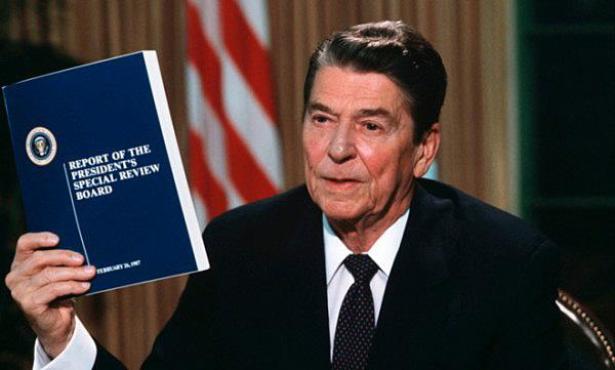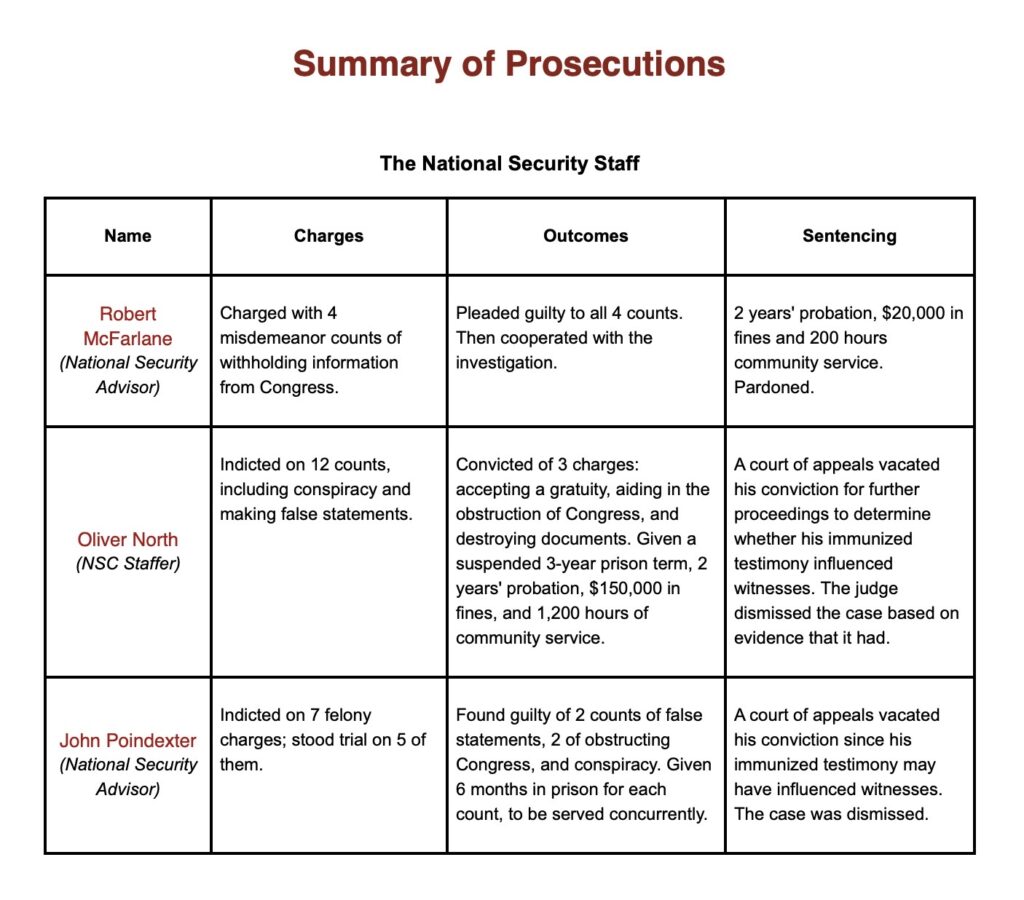Millions of Americans watched on split screen televisions in 1981 as Ronald Reagan took the oath of office. As Reagan recited a jetliner in Iran holding 56 American hostages rolled down a Tehran runway, its wheels lifting just as Reagan finished.
That precise timing fueled widespread—and reasonable— speculation in major newspapers and elsewhere that Team Reagan had cut some secret deal with the Iranian mullahs to further his chances of becoming president by making Jimmy Carter appear impotent.
The suspicions became known as the October Surprise conspiracy theory, generating lots of smoke with at least 14 people charged with felonies. The core problem was that despite admissions here and there, and Congressional hearings, no one entirely broke through the Reaganista code of silence, a testament to the loyalty that the former actor inspired among his acolytes.
Now a long-time Republican operative has come forward to Peter Baker of The New York Times to spill the beans about the extensive plotting by Reagan allies to force the hostages to endure captivity for months so that voters would deny Carter a second term.
What the Republican operative, Ben Barnes, revealed to the newspaper shows things were even worse than was widely imagined 42 years ago.
The lawlessness of the Reagan years matters because it shows that it is reasonable to believe that Ben Barnes’ late in life admissions about the illicit campaign to keep the American hostages in Iranian custody will stand up to scrutiny.
In 1980, Barnes flew from “one Middle Eastern capital after another that summer, meeting with a host of regional leaders to deliver a blunt message to be passed to Iran: Don’t release the hostages before the election. Mr. Reagan will win and give you a better deal.”
Barnes said he was fessing up at long last because he felt a moral obligation to do so before Jimmy Carter, now 98 years old and in hospice care, ran out of time.
Barnes, 85 years old, is no fringe character. He has been Speaker of the Texas House and played a role in young George W. Bush evading the Vietnam War era draft by obtaining a coveted slot in the Texas Air National Guard.
Enduring Months of Extra Captivity
Here’s my takeaway from Baker’s richly detailed piece: Reagan forced the hostages to endure months of additional city, all to satiate his lust for power.
That heartless, immoral, and lawless behavior goes to how the Reagan we all saw on television wasn’t the man himself but a character he played in politics. Journalist Lou Cannon, who for decades wrote superbly informed and insightful coverage of Reagan for the San Jose Mercury and then The Washington Post, titled his revealing Reagan biography “The Role of a Lifetime.”
While Reagan sold himself as a folksy man of the people, his cunning heart had room to be vicious, lawless, selfish, and embrace people who would lie and deny for him.
Similarly, many people perceived Reagan as a homophobe because of his years of silence as the mysterious HIV infections killed legions of gay men as well as hemophiliacs who used contaminated blood products. But Reagan had gay people on his staff, as I learned decades ago when, appearing unannounced at a home to pick up some camping gear, I walked in on an all-male party where I spotted a few Reaganites.
The new revelations printed Sunday are consistent with the immoral and deceitful conduct of the Reagan White House, which routinely ran roughshod over American law while polishing an image as champions of regulatory reform and tax cuts.
Again and again, Reagan and his spokespeople insisted that America would never negotiate with terrorists even as his administration swapped arms for hostages in deals involving piles of cocaine in what became known as the Iran-Contra scandal.
Reagan later fessed up, sort of, on national television, as you can watch here and later here. But while Reagan admitted to arms-for-hostages deals between Iran and Nicaragua, he never confessed to the role of cocaine trafficking from Colombia via Nicaragua into the United States to facilitate the scheme.
Taxpayer Money to Cocaine Traffickers
A Senate investigation led by then-Sen John Kerry of Massachusetts issued a 1,180-page report which found that the Reagan administration diverted American taxpayer money from humanitarian aid to cocaine traffickers. At Page 36, the committee wrote about:
“Payments to drug traffickers by the U.S. State Department of funds authorized by the Congress for humanitarian assistance to the Contras, in some cases after the traffickers had been indicted by federal law enforcement agencies on drug charges, in others while traffickers were under active investigation by these same agencies.
“These activities were conducted in connection with Contra activities in Costa Rica and Honduras.
“The Subcommittee found that the links forged between the Contras and the drug traffickers were primarily pragmatic rather than ideological. The drug traffickers, who had significant financial and material resources, needed the cover of legitimate activity for their criminal enterprises.”
14 Charged With Felonies
Iran-Contra resulted in at least 14 felony charges, with most accused being convicted or pleading guilty. They included three ex-military officers who served on Reagan’s National Security Staff. George H. W. Bush, Reagan’s vice president, became president in 1989 and poardeoned one of the three. Convictions of the other two were overturned on appeal.
Reagan White House National Security Staff Charged in Iran-Contra Scandal, Credit: Brown University.
The eight Reagan years were marred by more corruption than any other administration in the 20th century, counting even Calvin Coolidge of Teapot Dome infamy.
At least 138 Reagan allies were investigated, indicted, or convicted, according to a tally by Haynes Johnson, a Pulitzer Prize-winning Washington Post politics journalist, in his smart 1991 bestseller Sleepwalking Through History: America in the Reagan Years.
In contrast, no Obama-era official was indicted until the Trump administration prosecuted one Obama aide in what appeared to be a strategy to draw attention from Trump’s failed extortion of Ukraine for political gain. After a 13-day trial, a jury quickly acquitted lawyer Greg Craig on charges of lying to the FBI about Ukraine, charges that struck many as incredibly flimsy.
And then there was Reagan’s dishonesty in telling voters he would eliminate the federal debt (then less than $1 trillion) and cut their taxes. Instead, Reagan multiplied the debt while overseeing a massive downward shifting of tax obligations. The rich know what Reagan did for them, but few others recall his 11 federal tax hikes, which fell hard on the 90%, because Reagan successfully pawned them off on the White House press corps as mere “revenue enhancers.”
Reason to Believe
The lawlessness of the Reagan years matters because it shows that it is reasonable to believe that Ben Barnes’ late-in-life admissions about the illicit campaign to keep the American hostages in Iranian custody will stand up to scrutiny. The story Barnes tells fits the tenor of the Reagan era. And Barnes has plenty to lose for opening up. Reporter Baker’s reputation as arguably the most informed and clear eyed White House reporter ever combined with his solid reputation for checking out sources and their assertions also adds to credibility.
Baker’s Page One piece is written in classically cautious New York Times style. For example, Baker invokes the word “may” rather than “did” in writing that his source’s confession “adds a new understanding to what may have happened in that hard-fought, pivotal election year.”
Baker describes past Congressional investigations as having “debunked” various theories of what Team Reagan did during the 1980 election.
It would be just as accurate to say that Congressional hearings debunked some and failed to resolve others aming powerful indications that big things wer taking place in secret.
Why did this stay secret until now? Because the wrongdoers didn’t fear the Justice Department with Reagan’s trusted allies as Attorneys General: Californians William French Smith and Edwin Meese III followed by former Pennsylvania governor Richard Thornburgh.
Hostage Taking Today
The Sunday Times scoop can be read as a follow to Baker’s December piece about the Biden Administration winning the release of Britney Griner from Putin’s jails. Baker framed it as the story of one woman devoted to raising the profile of Americans held abroad on dubious charges. That woman, Diane Foley, created the James W. Foley Legacy Foundation after Middle East radicals murdered her son James.
“More than ever, the hostage-takers are no longer terrorist groups,” Baker wrote then, “but foreign governments intent on making a point or a trade. While only four countries held Americans wrongfully from 2001 to 2005, 19 countries currently do, according to the [James W. Foley Legacy] foundation’s research, including not just Russia but China, Iran, Venezuela and Syria.”
Ms. Foley is right to focus on state-controlled hostage-taking. During Trump’s one term, I circled the globe several times speaking critically about him and other issues. Still, I made it a point never to set foot in authoritarian countries seeking to curry favor with Trump: Russia, Saudi Arabia, and the United Arab Emirates.
In February, our State Department advised all Americans to leave Russia out of concern that Putin’s minions would fabricate bogus charges to arrest them.
Read Peter Baker’s New York Times piece. Set it aside and reread it later in the week. And think about what it tells us about how easily we, the voters, get played by operatives of the win-at-all-costs school politics and the politicians who embrace and employ them.
David Cay Johnston co-founded DCReport. He is a best-selling author and investigative journalist who for 13 years reported for The New York Times. Johnston is a specialist in economics and tax issues. He won a 2001 Pulitzer Prize. He teaches at Syracuse University College of Law.



Spread the word